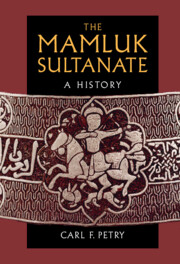Book contents
- The Mamluk Sultanate
- The Mamluk Sultanate
- Copyright page
- Dedication
- Contents
- Figures
- Maps
- Maps
- Introduction
- 1 Synopsis of Events
- 2 Ethos of the “Slave-Soldiers” Regime
- 3 The Mamluk Sultanate from a Global Perspective
- 4 Vocational Classes
- 5 The Political Economy
- 6 Cultural Legacy
- 7 The Rural Environment, Gendered Issues, Minority Communities, Sufi Practice
- Reflections
- Notes
- Bibliography
- Index
Reflections
Published online by Cambridge University Press: 05 May 2022
- The Mamluk Sultanate
- The Mamluk Sultanate
- Copyright page
- Dedication
- Contents
- Figures
- Maps
- Maps
- Introduction
- 1 Synopsis of Events
- 2 Ethos of the “Slave-Soldiers” Regime
- 3 The Mamluk Sultanate from a Global Perspective
- 4 Vocational Classes
- 5 The Political Economy
- 6 Cultural Legacy
- 7 The Rural Environment, Gendered Issues, Minority Communities, Sufi Practice
- Reflections
- Notes
- Bibliography
- Index
Summary
The preceding survey revealed ongoing change with regard to the traits Ibn Khaldun attributed to the Mamluk military elite. Their evolution over time reflected the elite’s pragmatic adaptation to shifting circumstances of the political setting in which they pursued their careers, the economy they exploited to remunerate their hegemonic lifestyles, and the global environment they confronted that had altered profoundly in the course of 267 years. While contemporary observers sporadically disparaged the elite for lapsed martial skills, factional infighting, and fiscal corruption, their respect for its dedication to upholding the integrity of the Muslim Commonwealth was genuine, albeit tenuous in the Sultanate’s latter years. When the Sufi shaykh Abu Saʿud prodded the Mamluk officers, who accompanied Tuman Bay to his shrine in the face of impending invasion, to forswear betrayal in return for his reluctant acceptance of their acclamation, he also demanded they cease oppressing the masses – who were fellow believers (cf. Chapter 4). The shaykh’s ultimatum stressed abjuration of fiscal malfeasance but also a return to moral values that had allegedly lapsed. He laid emphasis on the elite’s fall from grace, their disrepute ubiquitous among Muslims regionally. To assuage it, they had to pledge themselves to a moral renewal and restoration of order according to Shariʿa. The officers’ acquiescence was predictable under the straitened circumstances. Whether they would have lived up to their oath cannot be known because of the Ottoman conquest the following year. This survey has aimed at tracing the circumstances behind the Mamluk cadre’s evolution on a distinctive path that led them to accept the shaykh’s admonition at this moment in time. It has underscored the cadre’s capacity to persevere in the face of daunting challenges from abroad and within. The fact of the cadre’s endurance has contributed to the Mamluks’ legacy as seen by its successors and its analysts in modern times. This legacy indelibly shaped the impression left by the Mamluks for posterity.
- Type
- Chapter
- Information
- The Mamluk SultanateA History, pp. 279 - 282Publisher: Cambridge University PressPrint publication year: 2022

